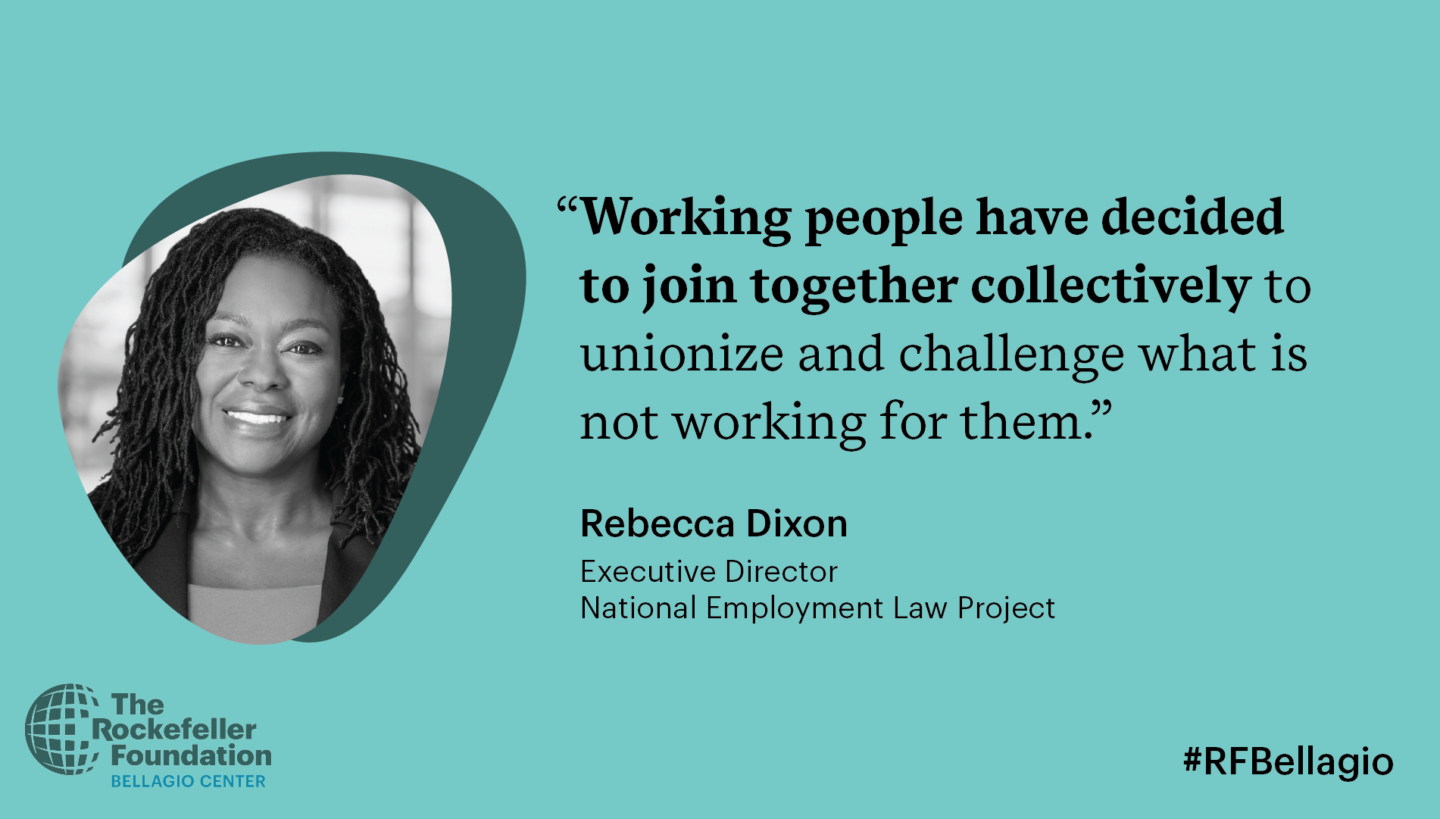Editor’s note: For Rebecca Dixon, political is personal. As Executive Director of the National Employment Law Project (NELP), her commitment to advancing workers’ rights and economic justice is deeply rooted in her lived experience growing up in rural Mississippi at the intersection of race, class, and gender.
As a Bellagio Center resident in September 2022, she analyzed the laws, policies, and practices that undergird persistent segregation of opportunity examined what has worked in the past to narrow race and gender wage gaps and refined her strategic approach to advocacy efforts that advance racial and economic justice.
Her work calls on federal, state, and local governments to establish a timeline and concrete goals to close race and gender wage gaps. Without such specifics, she says, these gaps will continue to widen.
How is your work helping to build a more racially and economically just society?
I grew up in rural southwest Mississippi in a working-class family. As Black folks, we were pretty much relegated to the bottom of the labor market. It didn’t matter how smart my dad was or how hard he worked. He was limited in his job prospects and earning potential. It meant that a lot of his work didn’t count towards earned benefits such as Social Security or unemployment insurance. Since my lived experience has been shaped by this exclusion, this work feels like my calling.
There are still millions of workers who are excluded from these foundational rights. At NELP, we are making sure they are purposely included in solutions and not left out. Often, when policy is created, people tell women and workers of color “we will come back for you later” – and “later” never happens.
Consequently, the work we do is really important to me in terms of the mission, making sure that everyone has the right to have a good job, and it doesn’t matter who you are or what kind of work you do, that the work has dignity and actually is economically supporting you, your family, and your community.
What keeps you up at night about achieving your goals? What makes you optimistic?
The thing that keeps me up at night is this sort of persistence across time. Even though Black women have been earning college degrees since the ‘70s, they’re still in the lowest-paying jobs.
Education alone is not the answer. People are working hard and working multiple jobs, and still can’t thrive. Policymakers and corporations have stacked the system against folks in this way. In the United States, 87 percent of occupations are considered racially segregated, and that’s after you control education.
Persistently, the U.S. has had this labor market where opportunities are distributed by region, gender, and other kinds of characteristics. That’s so ingrained. How will our movement breakthrough?
In spite of this history, I’m excited about a simple thing that we could push for that could cascade a lot of other things. If the government said, ‘we want to close the racial wage gap between Black women and white men by 40 per cent by 2040,’ that means we can measure it. We can manage what we measure.
There is public discourse about the racial wealth gap, and no commitment by any federal, state or local government to close that gap by some certain percent and on a timeline. I think if we could, just at a high level, get a commitment from governments, we could accomplish that.
One of the things that I have in the works is something we’re calling a Labor Market Equity Index, which would track this across time and set clear expectations for leaders to close these gaps and build accountable plans that we can influence and track.

What breakthroughs do you envision needing to happen by 2050 for us to arrive at the racially and economically just society that you envision?
There needs to be massively more effort to support organizing and worker power, whether that’s by union membership or some other way, because we know from history that organizing counterbalances corporate power. It’s going to take a paradigm shift to move away from the idea that stockholder value is the only important thing to companies, to move away from the lack of responsibility for working people and what they provide.
The federal law around worker organizing is really stacked in favor of companies. There’s a whole infrastructure of union-busting that’s supported to prevent workers from organizing.
But we’re seeing workers reject that. Working people have decided to join together collectively to unionize and challenge what is not working for them. They know they need a vehicle for better conditions – this potential for change is incredibly exciting.
Learn More: Explore NDWA Labs and read NELP’s 2023 Policy and Advocacy Agenda. You can also read Rebecca’s Congressional testimony examining the racist exclusions in the Fair Labor Standards Act.